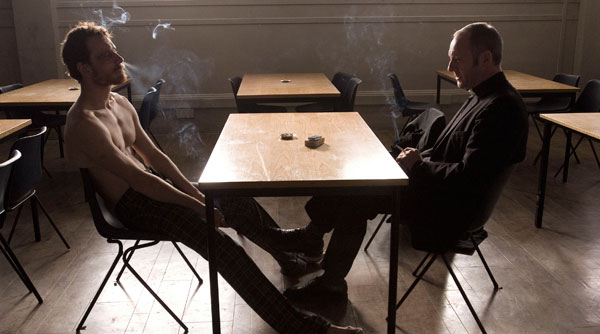 Rian Johnson's 2005 debut film, Brick, was a deservedly critically acclaimed piece of neo-noir, taking the world of Dashiell Hammett and moving it into a modern high school. Part of what made it so good was that combination of a world that is familiar because we've all lived it and a world that is familiar because we've grown up watching others live it. I was hoping for something similar when they first announced his follow-up, The Brothers Bloom. I knew it would be a con film, but I hoped there would be a twist. Unless some added quirk and an obvious Wes Anderson influence counts as a twist, my hopes were dashed, but I was not really disappointed in the film as a whole. It's not as good as Brick, which was an exciting, visually fascinating debut, but it is a very fun way to spend a couple hours.
Rian Johnson's 2005 debut film, Brick, was a deservedly critically acclaimed piece of neo-noir, taking the world of Dashiell Hammett and moving it into a modern high school. Part of what made it so good was that combination of a world that is familiar because we've all lived it and a world that is familiar because we've grown up watching others live it. I was hoping for something similar when they first announced his follow-up, The Brothers Bloom. I knew it would be a con film, but I hoped there would be a twist. Unless some added quirk and an obvious Wes Anderson influence counts as a twist, my hopes were dashed, but I was not really disappointed in the film as a whole. It's not as good as Brick, which was an exciting, visually fascinating debut, but it is a very fun way to spend a couple hours.The film opens with a way-too-long prologue telling the story of the titular brothers' first con. We see the younger one, simply called Bloom, as a romantic who is uncomfortable with their actions while the older Stephen plans and predicts everything in advance, and he is always right. The narration is heaviest here (it's really only used early), and it is pretty bad, plus the child actors are unimpressive. Next, we see the adult brothers, Bloom (Adrien Brody) and Stephen (Mark Ruffalo) and their partner Bang-Bang (Rinko Kikuchi, from Babel) at the end of their latest con. Bloom is depressed, and despite Stephen's attempts to keep him, decides to quit. After a few months of hiding in Montenegro, Stephen finds him for one last con, involving eccentric American heiress Penelope, played by Rachel Weisz. Penelope has been alone for most of her life, studying everything and picking up hobbies. Her money is limitless, and she goes through three or four different Lamborghinis in her first ten minutes of screen-time. She is fun and quirky and Bloom quickly falls for her. Under the guise of antique dealing, the group winds up in Prague, and through a complicated, but still perfectly clear (one of the film's strengths is that it doesn't heavily rely on bad expositional dialogue) scheme, they get part of her money and move to Mexico to get the rest. Here, parts of the brothers' pasts and Bloom's feelings for Penelope begin to become an issue, and Bloom begins to wonder how he can get her out of the game.
The film does have issues. There is a lot of really obvious foreshadowing in the beginning, and, despite the stunning locations, I was kind of disappointed in the visuals. Johnson fails to really utilize everything around him, and many of the shots that do work don't come up until the end. There are also some cliche moments in the script, especially when the brothers constantly talk about living an "unwritten life," but the good certainly outweighs the bad in terms of dialogue. The film's sense of irony and some of the camera motions (especially in the way it pans from person to person) come off as Wes Anderson-light. If you added some brighter colors, a bit more irony and replaced Ruffalo and Brody with Owen and Luke Wilson, it would probably be a pretty good Anderson picture, but I love Anderson's work, so this didn't really bug me. Whatever flaws I found were outweighed by the breezy sense of fun and adventure. A large part of this was due to the actors. Brody's character is the "normal" one, and, while he isn't great here, he provides a solid emotional center. Ruffalo gets some juicy monologues, and he does a very good job with them, creating a likable character where a lesser actor would have seemed too sinister. Weisz, who I'm normally not a huge fan of, shows that comedy is one of her strengths, perfectly portraying her character's awkwardness and her transformation into a "normal" person. The real star in this film is Kikuchi. I hated Babel. I think it's one of the worst films of the decade, just the equally bad Crash on a larger scale, but she was very good in her Oscar-nominated role as a Japanese mute. Here, she plays a Japanese mute again, but this time her character exists mainly for laughs, and she gets them. Every little look she gives, even from the background, completely steals the scene, and the audience, at least in my screening, reacted wonderfully to her character.
The film manages to avoid many of the cliches of the con-man film (although some just have to be there) and there are some great bits of dialogue ("My brother writes jobs like dead Russians write novels") and memorable characters. I'm not sure what exactly the film was aspiring to be, but, despite a couple little issues here and there and the fact that it doesn't quite live up to the fantastic poster at the top of this review (seriously, how awesome is that thing?), it works wonderfully as a fun and breezy adventure story.
Rating (out of ****): ***






